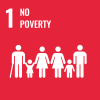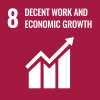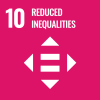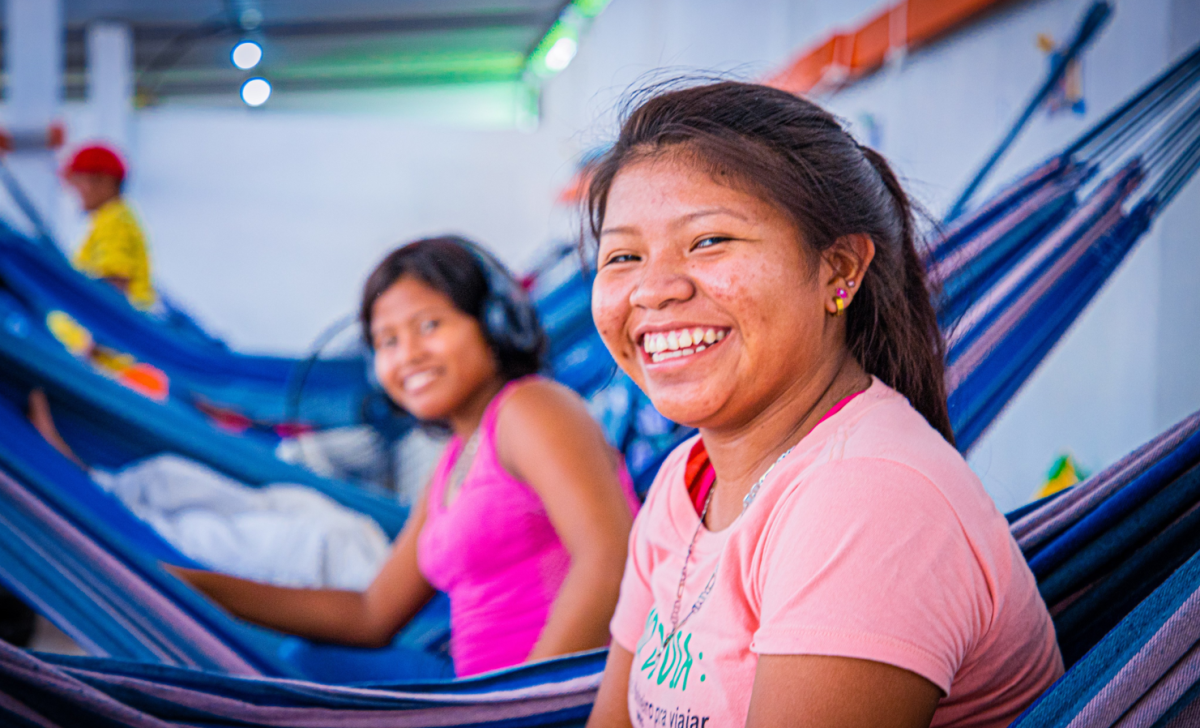
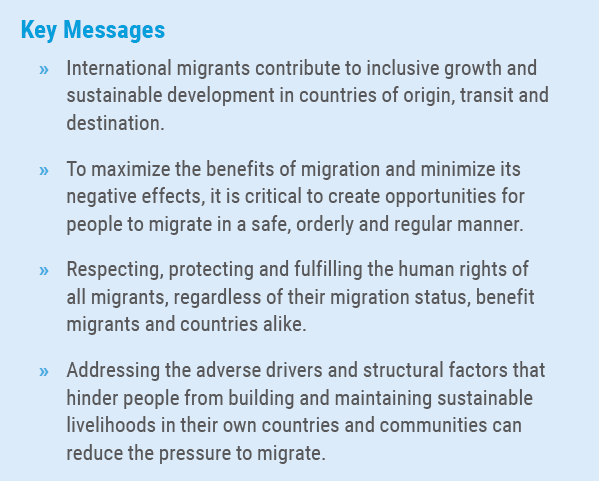 International migration can facilitate the achievement of many Goals and targets of the 2030 Agenda for Sustainable Development
International migration can facilitate the achievement of many Goals and targets of the 2030 Agenda for Sustainable Development
International migration is an integral part of the development process in countries of origin, transit and destination. The 2030 Agenda for Sustainable Development includes several targets related directly to international migration or migrants. The most explicit among them is target 10.7, which calls on countries to facilitate orderly, safe, regular and responsible migration and mobility of people, including through the implementation of planned and well-managed migration policies. Other migration-related targets in the 2030 Agenda include strengthening and retaining the health workforce in developing countries (target 3.c), providing scholarships for study abroad (target 4.b), respecting the labour rights of migrant workers (target 8.8), reducing the costs of transferring remittances (target 10.c), ending human trafficking (targets 5.2, 8.7 and 16.2), establishing legal identity, including through birth registration (target 16.9) and disaggregating data by various characteristics, including migratory status (target 17.18). In addition, international migration can facilitate the achievement of other Goals and targets of the 2030 Agenda, including those related to eradicating poverty, facilitating access to health care, education and decent work, and promoting economic growth and gender equality.
International migrants contribute to the sustainable development of countries and communities of origin
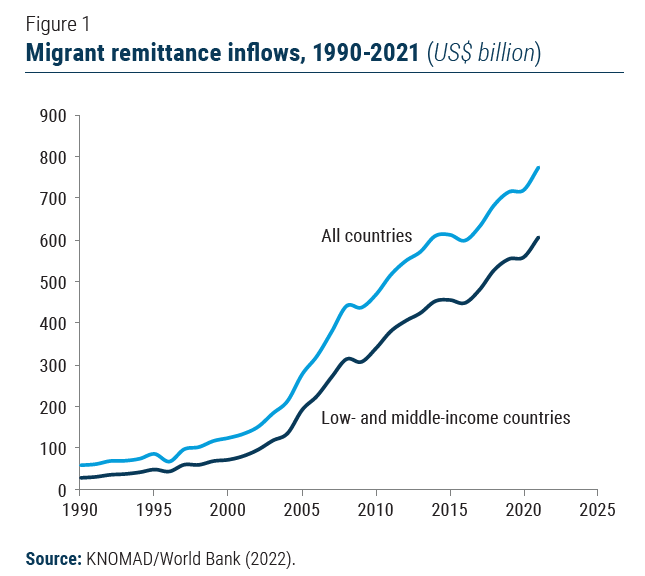 In 2021, migrants sent home $773 billion in remittances, of which $605 billion to families in low-income or middle-income countries. Remittances boost household incomes and reduce poverty in countries and communities of origin. They can also help to increase school enrollments, improve access to health care, boost agricultural productivity, facilitate financial inclusion and support business creation (Zlotnik, 2019; figure 1). Typically counter-cyclical in nature, remittances also help to protect against economic shocks. In addition, international migration can benefit places of origin by promoting foreign direct investment from diaspora communities, fostering the transfer of skills and technology, and encouraging bilateral trade (Burns and Mohapatra, 2008; Chowdhury, and others, 2022). When it increases women’s bargaining power within families, migration helps to promote gender equality and the empowerment of women (Antman, 2015). International migration, however, can also have negative impacts on achieving the Goals and targets of the 2030 Agenda in countries of origin. The emigration of large numbers of medical personnel, for instance, can adversely affect the attainment of health-related targets in countries where access to health care is limited and the number of trained health-care professionals is insufficient (target 3.c). More fundamentally, international migration alone cannot remove the structural constraints and impediments to sustainable development faced by many countries, particularly the least developed countries (LDCs) (De Haas, 2012). To maximize the benefits and minimize the negative impacts of migration, a multi-pronged approach is needed. On the one hand, it is important to address the adverse drivers and structural factors that hinder people’s ability to fulfill their aspirations while remaining in their own countries. Creating opportunities for sustained, inclusive and sustainable economic growth and decent work by various means, including through foreign direct investment and by investing in human capital (for example, expanding the number of scholarships available to developing countries as called for in target 4.b) is critical. On the other hand, the transformative power of migration can be expanded by reducing the cost of remittances in line with SDG target 10.c, by encouraging the productive investment of remittances in local economies and by tapping into the skills and resources of transnational communities (Adepoju, 2011).
In 2021, migrants sent home $773 billion in remittances, of which $605 billion to families in low-income or middle-income countries. Remittances boost household incomes and reduce poverty in countries and communities of origin. They can also help to increase school enrollments, improve access to health care, boost agricultural productivity, facilitate financial inclusion and support business creation (Zlotnik, 2019; figure 1). Typically counter-cyclical in nature, remittances also help to protect against economic shocks. In addition, international migration can benefit places of origin by promoting foreign direct investment from diaspora communities, fostering the transfer of skills and technology, and encouraging bilateral trade (Burns and Mohapatra, 2008; Chowdhury, and others, 2022). When it increases women’s bargaining power within families, migration helps to promote gender equality and the empowerment of women (Antman, 2015). International migration, however, can also have negative impacts on achieving the Goals and targets of the 2030 Agenda in countries of origin. The emigration of large numbers of medical personnel, for instance, can adversely affect the attainment of health-related targets in countries where access to health care is limited and the number of trained health-care professionals is insufficient (target 3.c). More fundamentally, international migration alone cannot remove the structural constraints and impediments to sustainable development faced by many countries, particularly the least developed countries (LDCs) (De Haas, 2012). To maximize the benefits and minimize the negative impacts of migration, a multi-pronged approach is needed. On the one hand, it is important to address the adverse drivers and structural factors that hinder people’s ability to fulfill their aspirations while remaining in their own countries. Creating opportunities for sustained, inclusive and sustainable economic growth and decent work by various means, including through foreign direct investment and by investing in human capital (for example, expanding the number of scholarships available to developing countries as called for in target 4.b) is critical. On the other hand, the transformative power of migration can be expanded by reducing the cost of remittances in line with SDG target 10.c, by encouraging the productive investment of remittances in local economies and by tapping into the skills and resources of transnational communities (Adepoju, 2011).
Countries of destination reap many economic and social benefits from international migration
Migrants often play a crucial role in the economies and societies of host countries by providing critical skills and labour. A striking illustration of the contributions of migrant workers to countries of destination emerged during the coronavirus disease 2019 (COVID-19) pandemic. Without the work of millions of essential migrant workers, vital sectors of the economy in many host countries would have faced severe labour shortages. International migration can also have a positive impact on the demographic outlook of receiving countries by delaying or lessening the extent of population ageing and by slowing or averting population decline. Such impacts tend to be most significant in countries at advanced stages of the demographic transition—when both fertility and mortality have fallen substantially—and where migrant inflows are substantial compared to the size of the population (United Nations, 2021a). In such countries, international migrants often comprise a relatively large share of the total working-age population (figure 2). International migration can ease, at least temporarily, fiscal pressures on public pension and health-care systems in host countries with rapidly ageing populations (Clements and others, 2018; Han, 2013; Marois and others, 2020). However, a large influx of migrants, especially when it occurs in an irregular manner, can have adverse effects on host societies, straining resources and raising concerns about security and social cohesion. Local communities can be negatively affected by such inflows, which place an additional strain on the provision of services, housing and infrastructure. Globally, 68 per cent of Governments report that they view irregular migration as a major concern, while another 25 per cent see it as a minor concern (United Nations, 2020b). By creating more opportunities for legal migration, countries of destination can increase the contribution of migration to development. This requires regularly assessing labour market needs and setting migration policies accordingly. Globally, over 84 per cent of Governments report having a national policy or strategy for providing legal migration pathways, including for labour migrants, while 69 per cent indicate that they regularly align migration policies with actual and projected labour market needs (United Nations, 2021b). 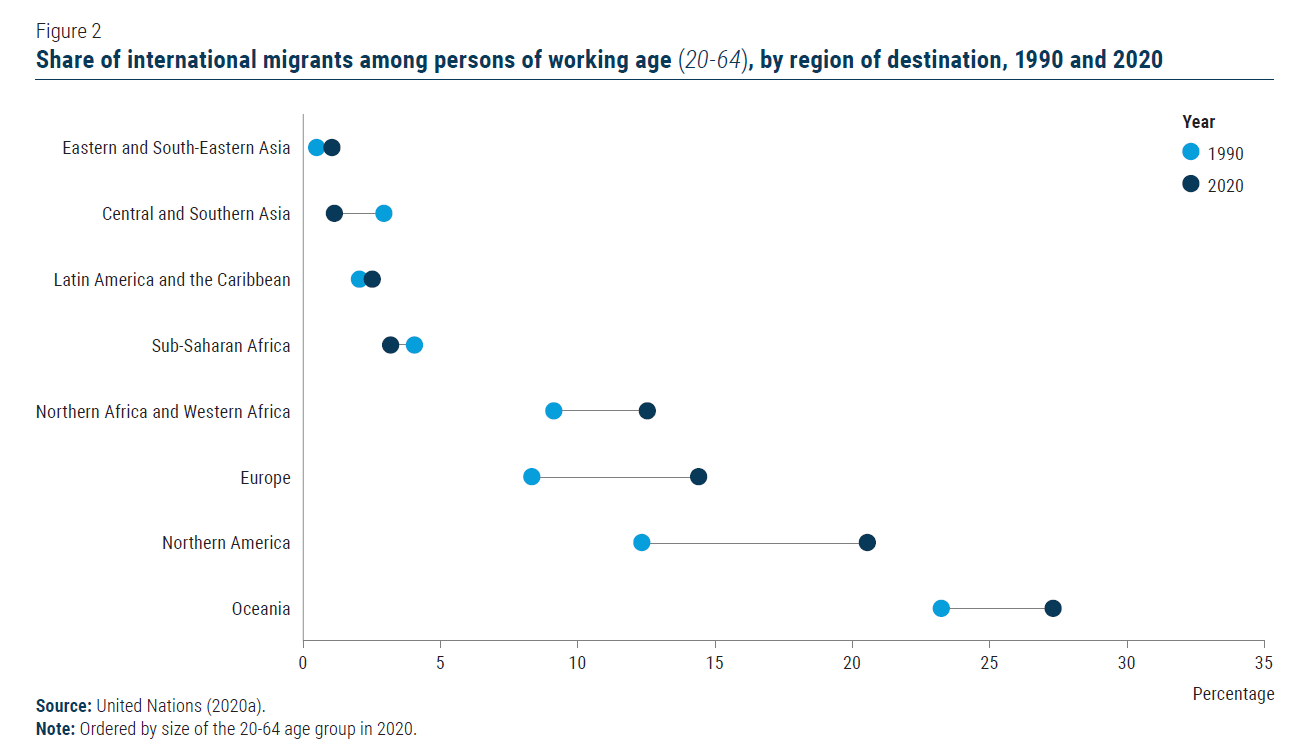
Creating more opportunities for safe, orderly and regular migration can reduce the human costs of migration
When given a choice, most people prefer to live, work and prosper in their own countries. When that is not possible, however, international migration can offer a pathway to escape from deprivation and vulnerability and, in some cases, to fulfill aspirations for a better life. Unfavourable political, economic, social and environmental circumstances in countries of origin, combined with unrealistic perceptions of the opportunities available abroad and a limited understanding of the associated risks and dangers, can lead people to migrate even when they do not have access to safe and regular pathways. Under such circumstances, migrants are more vulnerable to exploitation and abuse. Since 2014, more than 4,000 fatalities have been recorded annually along migratory routes worldwide, with many more migrant deaths going unrecorded (IOM, 2022). Around one in every six adults worldwide, equivalent to roughly three times the number of international migrants in 2020, have indicated in recent surveys that they would like to move to another country permanently if they had a chance to do so (Esipova, Pugliese and Ray, 2018). Some of the highest proportions of people reporting a desire to emigrate are found in low-income countries. However, people from such countries often lack the resources, training, skills and social networks to migrate in a safe, orderly and regular manner. It is critical, therefore, to create opportunities for people to migrate in a dignified and orderly fashion in line with target 10.7, upholding and protecting their human rights regardless of migration status. At the same time, Governments should seek to ensure that people who wish to emigrate are aware of the risks associated with irregular and unsafe movements, including the risk of human trafficking (targets 5.2, 8.7, 16.2), and are informed about the immigration requirements as well as labour market and living conditions in countries of destination.
Upholding migrant rights benefits migrants and countries alike
While international migrants are important agents of change, they can also be extremely vulnerable owing to discrimination or other social and economic barriers to their inclusion in host societies. Ensuring that no one is left behind is one of the overarching principles of the 2030 Agenda for Sustainable Development, affirming that the benefits of sustainable development must be shared by all members of society, including the most vulnerable. Respecting, protecting and fulfilling the rights of all migrants, irrespective of their migration status, support their inclusion in host societies and enhance the development potential of migration (United Nations, 2020b). At a minimum, host countries should ensure access to basic services, including health care and education, while addressing discrimination and promoting migrant integration (De Haas, 2012). Globally, 78 per cent of countries report having policies to promote migrant integration (United Nations, 2021b). Policies to address the vulnerability of migrant workers, end unfair labour practices, promote fair and ethical recruitment, facilitate the portability of social security benefits and recognize qualifications acquired abroad can also advance the beneficial impacts of migration and reduce its costs (targets 8.8). The inclusion of migrants in policymaking and development planning, as well as measures to ensure that migration policies are gender-responsive and child-sensitive, are essential to fulfilling the 2030 Agenda’s pledge that no one will be left behind. Increasing the availability of high-quality, timely and reliable data disaggregated by migratory status in line with target 17.18 is also critical in this regard.
 Welcome to the United Nations
Welcome to the United Nations
